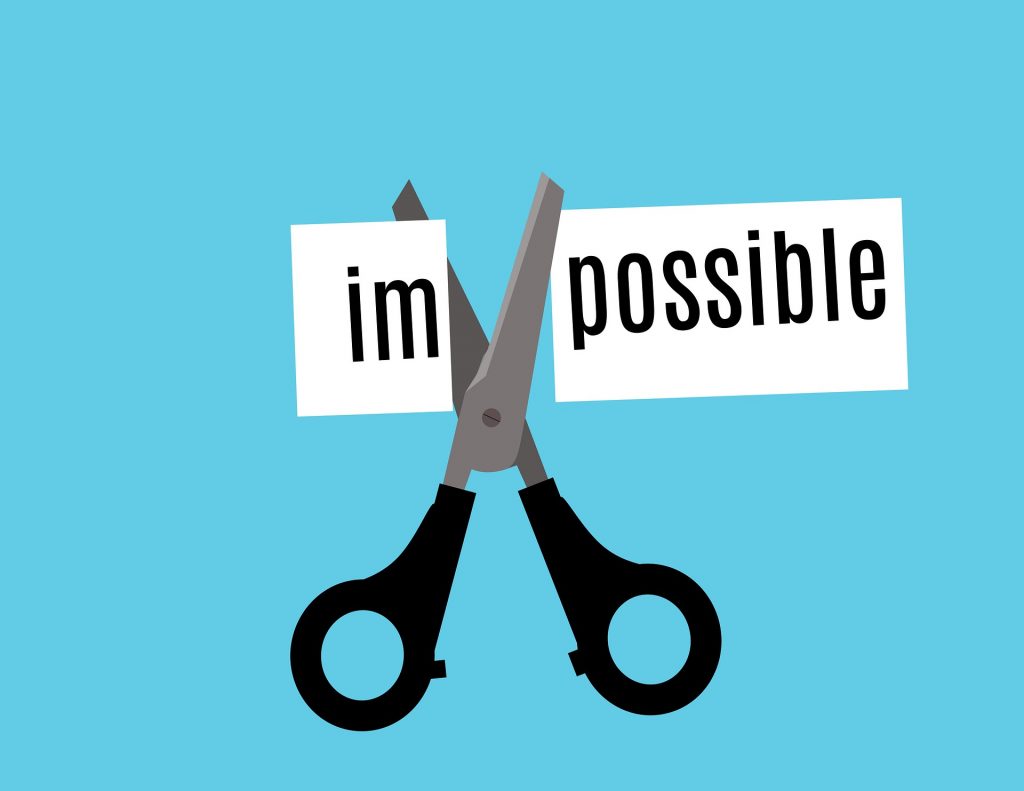How to Not Give Up on Yourself

It is very easy to give up and say “I can’t do [something].” Giving up is a choice, but it is tempting to choose the option of giving up when you feel helpless. Daily, we give up on making our bed, talking to our friends, and crossing out the long to-do list. But we find ourselves doing it the next day or in the next hour. We tie our shoelaces and get up again because those choices require less conflict to make.
What about giving up on yourself?
Giving up on yourself is living with uncertainty. When you give up on yourself, you live in uncertainty knowing that you’re not taking life with its full rich meaning. You’re just away from the light to improve, grow wisdom, and happiness so you’re walking in the dark, not able to see anything clearly: your goals, your needs, and maybe other people’s needs.
To pull yourself out of the uncertainty, you need to know yourself, understand yourself, love yourself, and trust yourself. Even believing in yourself is hard, additionally, you may be affected by emotional stress, trauma, disillusionment. Not believing in yourself is the chief harm to personal improvement because you become a passenger and not the driver of your life.
Here are some tips that may help lift the weight of your upbringing, and hopefully show you how to not give up on yourself.
- You have survived.
You have come a long way, and you survived all those dreadful days and hopeless years when your future seemed clouded. Take a moment to recall all the times you’ve pulled it through, then celebrate your triumph because the struggles were tough, but you were TOUGHER.
There is no moment in which you were alone, although you’ve seen smiles on everyone’s faces and not yours, doesn’t mean they are not secretly struggling.
If you do decide to “give up”, redefine it to more of a “pause.” But do not give up, as Walt Disney has put it: “After the rain, the sun will reappear. There is life. After the pain, the joy will still be here.”
You have survived much much worse, stabilize yourself, and don’t let life throw you around until you fall, rather take charge to fill your life and others around you with happiness. In short, life is too short to live in pretending or uncaring ways.
- Keep a cool head and a warm heart.
In the face of COVID-19, it is more difficult to keep a cool head and a warm heart. However, we are resilient more than we give ourselves credit for. In these times, it is more important than ever to keep being supportive of yourself and others.
Acquire equanimity is necessary, for equanimity is the presence of mind, which is much needed to be at peace with yourself. As a guide to when you are lost, equanimity is a state when you touch reality and see reality for what it is while encompassing love, compassion, and a balanced lifestyle.
- Failure is not you. You are not a failure.
Believe it or not, failure is just a point in your progress, it doesn’t define you unless you let it become an inhibitor to prevent you from moving forward.
This quote from John Wooden, “As long as you try your best, you are never a failure. That is, unless you blame others,” gives us a new perspective about the flexibility of failure. Essentially, failure is what you make it to be.
So how should you take it? Take failure through the valuable lessons you learned. Failure is a legacy, and what legacy you want it to be is up to you. For it to become a long-lasting positive effect on your life, you could think of a way to deal with problems differently so you don’t bump into them again, control how you direct your attention to the problems, and most importantly, don’t let the definition of failure defines you.
Imperfection is healthy and learning never ends. When we accept our imperfection, we keep learning to become a well-rounded individual than we were before.
- Take it one day at a time.
Historians have repeated again and again that small steps are important. Indeed it is, making small steps is not only guaranteed a better result but also it is more prone to bigger changes.
Remember when you juggle multiple tasks at once and nothing seems to end up anywhere? Focus on what you CAN control. It is easier to focus on one day at a time because we can only control the priorities first. Taking it one day at a time helps you feel less suffocated by the stream of a difficult life/day.
For instance, it is more manageable to reflect one day at a time than to reflect when you forgot what struck you a week ago. Ultimately, nothing feels better than living and living in the moment.
Don’t let yesterday [nor tomorrow] use up too much of today. – Will Rogers.
- Open up to someone you trust.
Wouldn’t it feel better to open up to someone non-judgmental that shares with you one of the pieces of advice they got up their sleeves?
Open up to someone willing to lend an ear, and their understanding is wonderful. So don’t hold back if you have someone like that around.
- Be self-compassionate.
I know you have turmoil inside, one that is brewing like fire. Just like how you love your family, your best friend, your partner, you need to love yourself too and be kind to yourself.
Self-compassion is extending compassion to the parts you perceived as failure, inadequacy, and suffering to heal the wounds you have inside rather than to immerse yourself in criticism.
To be compassionate toward yourself is never to self-pity, it is full of love, kindness, and mindfulness.
And surely before you intend to care for and love someone else, you need to have the love to give. Therefore, you have to care about yourself first before you care about others.
- Be Proactive, Not Reactive.
What is the difference between being proactive and reactive?
Imagine you are driving home, and you have entered your neighborhood.
You are driving at a safe pace, and suddenly a man’s dog on the sidewalk ran towards the front of your car. You then stopped abruptly, waiting for it to clear the way.
The man on the sidewalk witnessed the situation and immediately yelled at you in an angry tone.
If you are a reactive person, you will react to the yelling and act on your emotions – more likely to yell back to the man or get angry at other people and things when you are home.
When you are proactive, you understand the man was being reactive, and you think first before acting – more likely proceed to apologize even though it was not your fault to lighten his mood.
What does this have anything to do with choosing to give up on yourself?
Problems come every day. When you are reactive to any difficult situation, your life is more likely to be miserable because you find fault with every little thing.
Instead, being proactive grants you the choice to take charge and control how you want to respond to the situation at hand.
You are causing what happens next, rather than realizing the consequences after you have caused it.
- Grow your Inner Strength.
When you accomplish self-trust, there will be a natural wave of inner strength that you find yourself simmer in.
By taking the necessary measures aforementioned: take it one day at a time, open up to someone you trust, be self-compassionate, have a proactive mindset – you have made progress in being stronger.
Thus, it is very hard for anything – even life itself – to sway you off your track, not alone to say you tend to give up on yourself.
So carry on, take higher measures, keep an enthusiastic attitude, and do not give up.
- Have a direction.
“Begin with the End in Mind. Control Your Own Destiny or Someone Else Will” – Sean Covey.
Be purposeful. Create your own mission statement and live by it. When you have a mission statement, everything you do must align with what pulls you towards that mission.
Take a look at an example mission statement from Google: Our company mission is to organize the world’s information and make it universally accessible and useful.
You could do the same with your mission statement, be it your words or someone else’s quote, it needs to maximize your livability and help you in some positive way.
New Year Resolution: your goal for the year, the month, the week, or the day all need to be reinforced by continuous efforts, by how you spent your time – all with a unified purpose to make the mission comes true.
In the beginning, I mentioned giving up on yourself is living with uncertainty, but now we are closing on the point of “have a direction.”
And if not believing in yourself is the chief harm to personal improvement, having a direction is the chief development to be who you want to be.
Finally, trust in yourself so that any fear cannot stop you from achieving your goal. Stop trying to fix yourself, and force yourself to do things you don’t really want to do. Live up to your potential, not down to other people’s expectations.
Henry Ford once said, “Whether you think you can, or you think you can’t–you’re right.”
So whether you think you can “pause” and get up again, or you think you can’t and stay dormant permanently, it is your choice.
References
Weiss, M. (2017, May 08). Re: I gave up on myself for almost a decade. How do I get myself back together and gain self-confidence again? [Blog comment]. Retrieved from https://qr.ae/pNDmNF
James, S. (n.d.). Don’t Give Up On Yourself. You Are Stronger Than You Think. Retrieved January 15, 2021, from https://projectlifemastery.com/dont-give-up/
Fader, S. (2021, January 05). Giving Up On Life? It Could Be A Sign You Need Help. Retrieved January 15, 2021, from https://www.betterhelp.com/advice/general/giving-up-on-life-it-could-be-a-sign-you-need-help/
Mayo Clinic. (2019, December 12). 5 ways to stop an anxiety spiral. Retrieved January 15, 2021, from https://www.mayoclinic.org/5-ways-to-stop-an-anxiety-spiral/art-20474268
Harrison, L. (2020, April 09). How can we keep a cool head and a warm heart in the face of covid-19? Retrieved January 15, 2021, from https://blogs.bmj.com/bmj/2020/04/09/how-can-we-keep-a-cool-head-and-warm-heart-in-the-face-of-covid-19/
Kuyken, W. (2020, March 25). Keeping a Cool Head and Warm Heart in Challenging Times. Retrieved January 15, 2021, from https://www.mindful.org/keeping-a-cool-head-and-warm-heart-in-challenging-times/
Kristin, N. (2011, May 27). Why Self-Compassion Trumps Self-Esteem. Retrieved January 15, 2021, from https://greatergood.berkeley.edu/article/item/try_selfcompassion




Responses